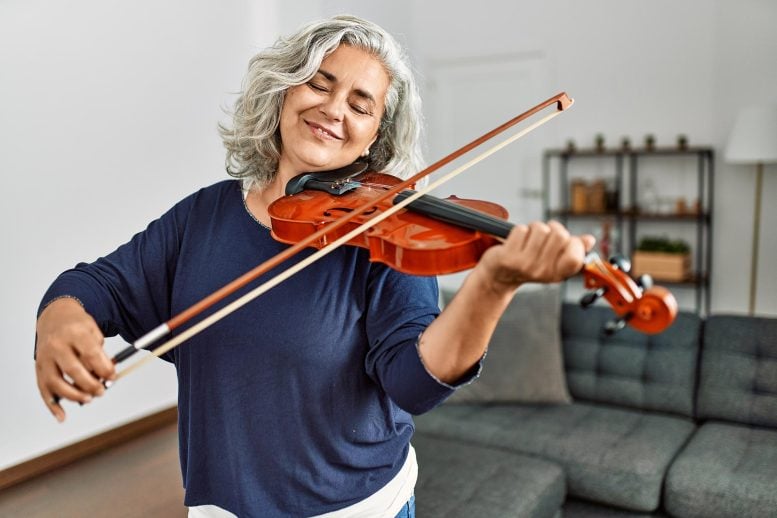Summary of Playing an Instrument Could Protect Against Cognitive Aging, Study Reveals:
A recent study published in PLOS Biology indicates that older musicians display brain activity patterns during speech perception that are similar to younger individuals. This suggests that long-term music playing may help older adults maintain their speech comprehension skills in noisy settings. The research was led by Claude Alain from Baycrest Academy.
*****
- Playing a musical instrument may protect against cognitive aging and help older adults retain speech perception abilities.
- A study shows older musicians exhibit brain activity patterns similar to younger individuals during speech perception.
- Long-term music engagement appears to enhance the brain’s ability to process speech in noisy environments.
- Research suggests a promising connection between musical experience and improved cognitive health in later life.
- Music may serve as a powerful tool for maintaining mental agility and enhancing speech comprehension abilities in aging individuals.
Welcome to an intriguing exploration of how the simple act of playing music might be your brain’s secret weapon against aging. Imagine this: a world where your favorite hobby not only brings joy but also stands as a beacon of cognitive health. Yes, let’s unwrap this delightful mystery about music’s potential to keep those mental gears whirring smoothly as the years go by.
The Melody of the Mind
Picture the graceful sway of a conductor leading an orchestra, each note precisely crafted to create a symphonic tapestry. Similarly, your brain orchestrates an intricate ballet of neurons as you absorb and process music. Playing an instrument could potentially be your backstage pass to a cognitive concert that plays far into older age.
At the heart of this tantalizing revelation lies a study published in PLOS Biology, showcasing how older musicians experience brain activity patterns that resemble those found in younger folks when processing speech. This isn’t just an academic curiosity; it hints at a rhythmic elixir with tangible benefits.
Musical Courage and Cognitive Fortitude
Let’s face it, life is noisy. Whether it’s the chatter of a bustling room or the cacophony of city life, disentangling useful sound from the background din becomes a tougher puzzle as we age. Yet, here’s where the plot thickens: seasoned musicians exhibit an uncanny ability to solve this auditory riddle with finesse. Playing an instrument, it seems, fine-tunes the brain’s capacity to decipher speech amid chaos.
Think of music as your brain’s gym, a place where cognitive muscles flex and strengthen over time. With each scale practiced and every melody mastered, neurons dance and form connections, building resilience. Engaging in long-term musical practice could be akin to giving your brain a set of noise-canceling headphones, fine-tuning it to pick out linguistic gems amidst interference.
The Harmonics of Youth and Age
Fascinatingly, the cerebral symphony of older musicians mirrors the youthful patterns found in younger individuals. It’s as if music polishes the auditory system’s crown jewels, aligning them in a way that defies the calendar’s tug. The study led by Claude Alain and his team at Baycrest Academy charts this awe-inspiring phenomenon, painting a future where age becomes merely a number rather than a barrier.
But how does strumming a guitar or tickling the ivories morph into this mental fortification? The magic lies in neuroplasticity—our brain’s remarkable ability to adapt and reshape itself. Engaging in musical activities taps into this prowess, nurturing not just musical skills but providing a robust cognitive scaffold.
Innovation or Age-Old Wisdom?
Before we herald this as groundbreaking, it’s worth noting the centuries-old wisdom that links music to mental wellness. From ancient Greece to the Renaissance, thinkers and artists marveled at music’s transformative power. What’s breathtaking is how modern science now echoes this sentiment, this time with brain scans and statistical confidence.
Imagine the ripples of this knowledge across generations. Parents might encourage their children not merely to play an instrument for artistic enrichment, but also as an investment in lifelong mental vitality. For those in their golden years, picking up that dusty saxophone could rekindle neural pathways, offering a brain workout that’s as beneficial as it is enjoyable.
Bursting the Bounds of Prediction
While we navigate the known facts, let’s keep our curiosity unrestrained. Could the cognitive boon from music extend beyond speech perception into realms like memory or creativity? While caution prevents us from leaping too far ahead of evidence, the panorama of possibilities is tantalizingly broad.
Imagine a world where communities harmonize—not just in a cultural sense, but within the fibers of neural collaboration. Could music be a cornerstone in cognitive therapies or prevention strategies? Only time, and further research, will reveal the full extent of music’s impact.
Inviting Music into Your World
How do you weave this sonic wonder into your own life? It’s simpler than you might think. Start small; perhaps dust off that old piano or explore an online tutorial for a new instrument. Dive into a library of music that spans genres and cultures—each a new world waiting to spark intrigue and engagement.
Join local musical groups or attend concerts, immersing yourself in the auditory tapestry that intertwines individuals. And for those inclined, composing your own melodies offers a pathway for personal expression and cognitive stimulation.
Charting New Pathways
This stimulating realm of discovery offers more than insights into protecting our mental faculties—it promises a journey of personal growth and exploration. The interplay between music and cognition is an invitation to expand our understanding of health, balance, and fulfillment.
In these revelations, we find music as more than mere entertainment; it’s a vessel for thriving minds and enriched lives. The notion that melodies and harmonies might echo in our brains some protective essence against the wear and tear of time is both inspiring and exhilarating.
So, where does this leave us today? Embrace the magic of music, not just as a muse but as an ally in life’s grand symphony. Whether you create, listen, or simply appreciate, allow music to infuse your world with its dual powers of joy and cognitive fortitude. The music of your life need not fade; let it crescendo with the promise of enduring mental agility, vibrant till the final verse.


